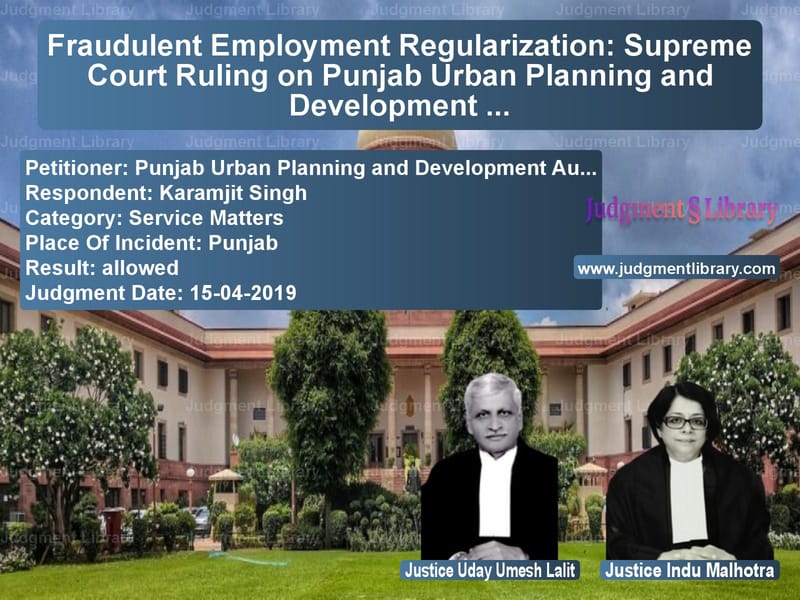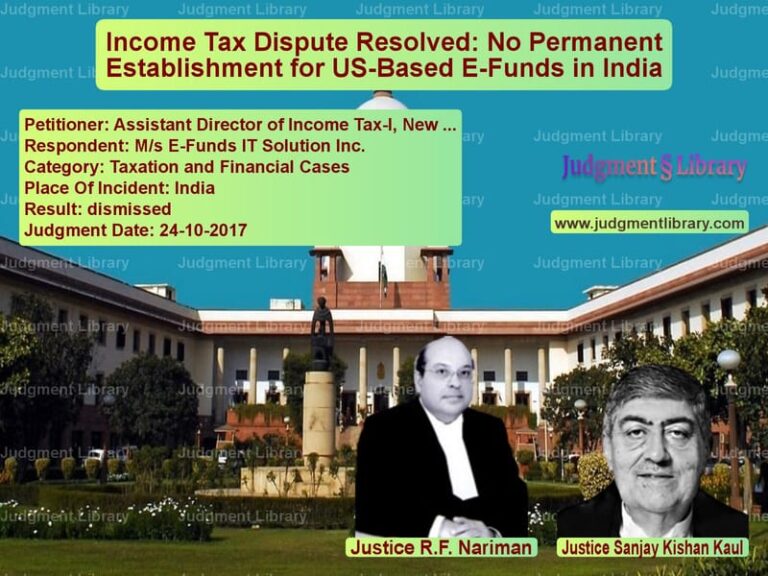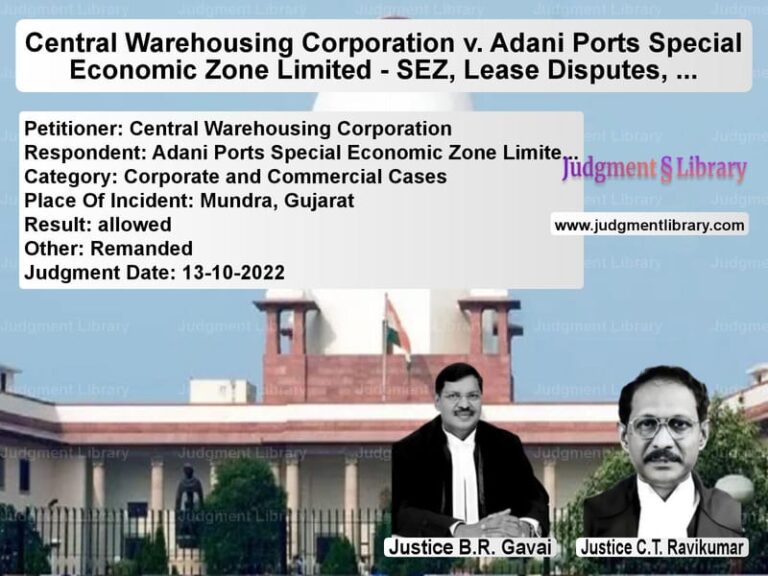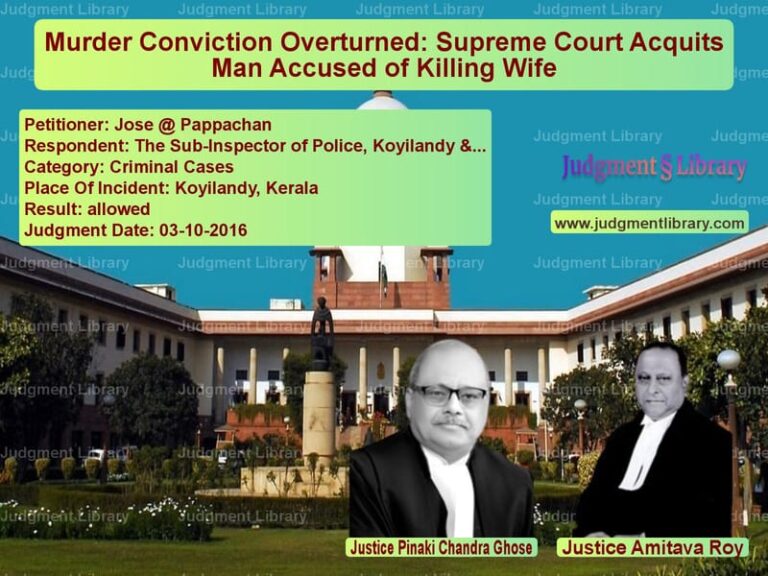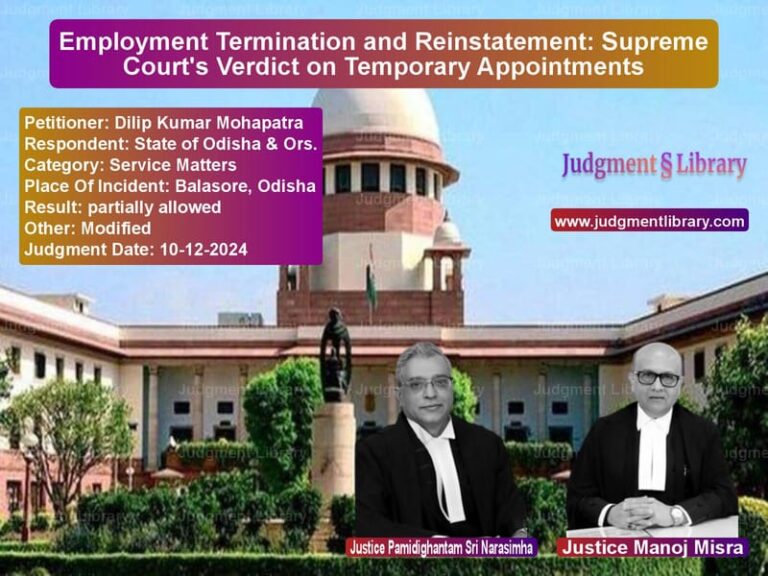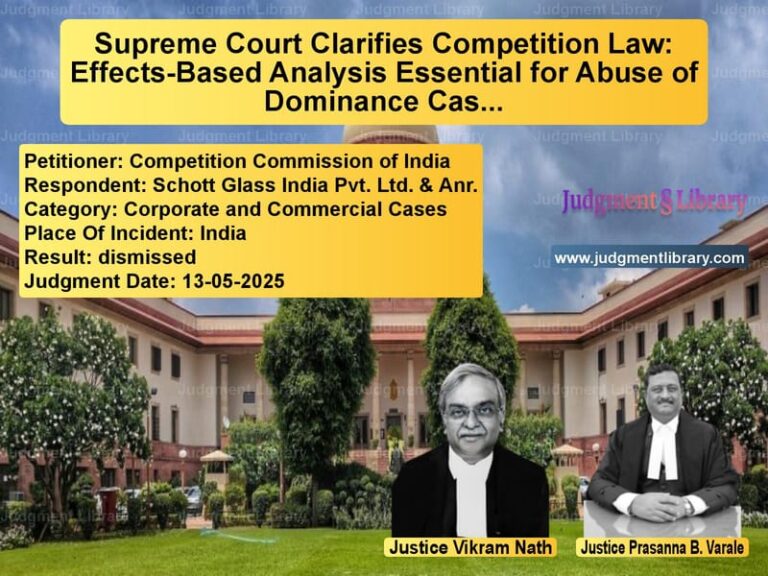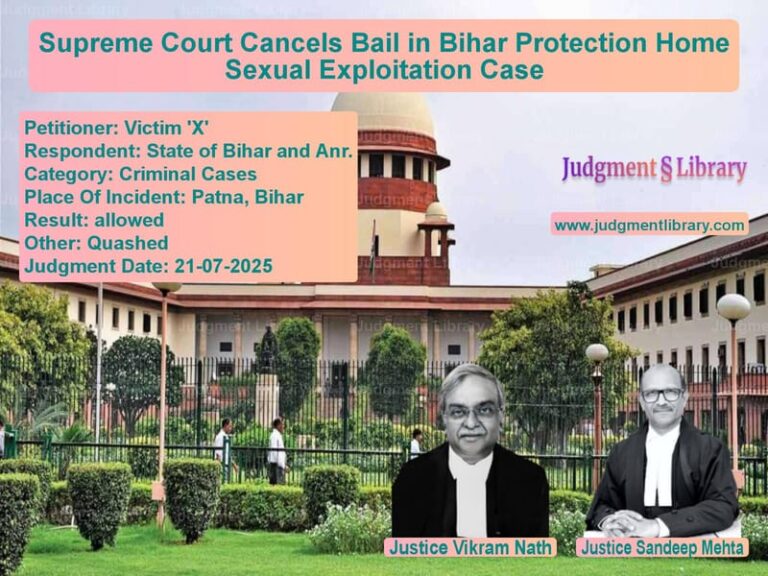Fraudulent Employment Regularization: Supreme Court Ruling on Punjab Urban Planning and Development Authority Case
The Supreme Court of India delivered a significant judgment in the case of Punjab Urban Planning and Development Authority & Anr. vs. Karamjit Singh, addressing a crucial issue concerning the regularization of employment in public sector undertakings. This case highlights the legal principles surrounding wrongful employment regularization, the necessity of fulfilling eligibility criteria, and the implications of fraudulent claims in securing government employment. The judgment also provides clarity on the legal recourse available to affected parties and reinforces the fundamental principle that appointments secured through misrepresentation or fraud cannot be upheld.
Background of the Case
The case originated from the employment of Karamjit Singh, who was initially appointed as a daily wage Chowkidar on December 1, 1995, by the Punjab Urban Planning and Development Authority (PUDA). His employment was recorded in the muster rolls until March 31, 1997. The Punjab government, through a policy revision dated January 23, 2001, introduced criteria for the regularization of daily wage and work-charged employees who had completed a minimum of three years of continuous service before January 22, 2001.
Following this policy, PUDA issued an office order on December 26, 2001, regularizing the services of 102 daily wage workers, including Karamjit Singh. However, certain employees challenged this regularization, citing procedural irregularities and alleging that some workers, including the respondent, had been regularized without fulfilling the eligibility criteria. This led to a re-evaluation of the employees’ service records.
Upon scrutiny, it was found that Karamjit Singh had not completed the mandatory three years of continuous service required under the revised policy. Consequently, PUDA issued an order on May 22, 2003, annulling his regularization and terminating his services. This decision was based on findings that his name had been fraudulently included in the list of employees eligible for regularization.
Legal Battle and High Court Proceedings
Aggrieved by the termination, Karamjit Singh challenged the order before the Punjab & Haryana High Court through a writ petition. The High Court, on October 23, 2003, dismissed his petition but granted him the liberty to approach the Labour Court. Subsequently, he raised an industrial dispute, claiming wrongful termination in violation of the Industrial Disputes Act, 1947.
The Industrial Tribunal, Patiala, examined the matter and, on October 15, 2013, dismissed his claim, stating that the regularization was obtained through wrongful means and could not be sustained. The Tribunal upheld the legality of PUDA’s termination order, stating that the respondent had secured his employment regularization fraudulently and was never entitled to permanent employment benefits.
Despite the Tribunal’s ruling, Karamjit Singh approached the Punjab & Haryana High Court again. This time, a Single Judge bench ruled in his favor on February 7, 2018. The court reasoned that since he had been regularized—whether rightly or wrongly—he was entitled to due process under the applicable employment regulations before termination. The judge directed PUDA to conduct a full-fledged disciplinary inquiry before taking any further action.
PUDA, dissatisfied with the Single Judge’s ruling, challenged the decision before the Division Bench of the Punjab & Haryana High Court. However, the Division Bench upheld the Single Judge’s decision on July 9, 2018, reinforcing the requirement of a disciplinary inquiry before termination.
Supreme Court’s Verdict
PUDA escalated the matter to the Supreme Court, challenging the High Court’s findings. The Supreme Court, in its judgment dated April 15, 2019, overturned the High Court’s decision and upheld the termination of Karamjit Singh. The apex court provided a detailed analysis of the evidence and legal principles involved, making the following key observations:
- Failure to Meet Eligibility Criteria: Karamjit Singh did not meet the requirement of three years of continuous service before January 22, 2001, making him ineligible for regularization under the government’s revised policy.
- Fraudulent Inclusion in the Regularization List: Official records revealed that Karamjit Singh’s name was not part of the original list of employees recommended for regularization. His name was fraudulently added later, indicating misrepresentation.
- Disciplinary Inquiry Against Officials: PUDA conducted an internal inquiry and found that certain officials were guilty of manipulating records to include ineligible employees in the regularization list. Disciplinary action was taken against these officials.
- No Right to Regularization Through Fraud: The Supreme Court reiterated that fraudulent appointments do not entitle an employee to claim protection under employment regulations or the Industrial Disputes Act, 1947.
Key Legal Principles Established
The Supreme Court, while ruling in favor of PUDA, reinforced several key legal principles:
- Employment Regularization Must Be Lawful: Employees must meet the eligibility criteria outlined in government policies for their regularization to be valid.
- Fraud Nullifies Employment Rights: If employment is secured through misrepresentation or fraud, the employee loses any claim to the protection of labor laws or employment regulations.
- Disciplinary Inquiry Not Mandatory for Fraudulent Appointments: The court clarified that since Karamjit Singh’s regularization itself was unlawful, he was never a permanent employee and, therefore, was not entitled to a disciplinary inquiry before termination.
The court quoted established legal precedents, including:
“An order of regularization obtained by misrepresenting facts, or by playing a fraud upon the competent authority, cannot be sustained in the eyes of law.”
It further emphasized the ruling in Rajasthan Tourism Development Corporation & Anr. v. Intejam Ali Zafri, stating:
“If the initial appointment itself is void, then the provisions of the Industrial Disputes Act, 1947, are not applicable for terminating the services of such a workman.”
Final Judgment
The Supreme Court allowed the appeal, setting aside the Punjab & Haryana High Court’s decision. The judgment confirmed that:
- Karamjit Singh’s appointment was invalid as he did not fulfill the required service period for regularization.
- His inclusion in the regularization list was fraudulent and, therefore, legally void.
- PUDA was justified in terminating his employment without conducting a disciplinary inquiry.
The court, however, permitted Karamjit Singh to withdraw Rs. 25,000, which had been deposited by PUDA towards litigation costs, acknowledging the prolonged legal proceedings.
Conclusion
This judgment reinforces the principle that fraudulent employment claims cannot be legitimized through judicial intervention. It upholds the sanctity of government employment policies, ensuring that only eligible employees receive the benefits of regularization. The ruling serves as a strong precedent in preventing the manipulation of employment records and strengthens the legal framework governing public sector employment.
Petitioner Name: Punjab Urban Planning and Development Authority & Anr..Respondent Name: Karamjit Singh.Judgment By: Justice Uday Umesh Lalit, Justice Indu Malhotra.Place Of Incident: Punjab.Judgment Date: 15-04-2019.
Don’t miss out on the full details! Download the complete judgment in PDF format below and gain valuable insights instantly!
Download Judgment: Punjab Urban Plannin vs Karamjit Singh Supreme Court of India Judgment Dated 15-04-2019.pdf
Direct Downlaod Judgment: Direct downlaod this Judgment
See all petitions in Employment Disputes
See all petitions in Termination Cases
See all petitions in Disciplinary Proceedings
See all petitions in Judgment by Uday Umesh Lalit
See all petitions in Judgment by Indu Malhotra
See all petitions in allowed
See all petitions in supreme court of India judgments April 2019
See all petitions in 2019 judgments
See all posts in Service Matters Category
See all allowed petitions in Service Matters Category
See all Dismissed petitions in Service Matters Category
See all partially allowed petitions in Service Matters Category

